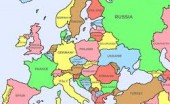Re Ian Bremmer 'Could third-party candidates upend the 2024 US election?' 3 April The current political movement in the USA…
Wednesday Night #1849 with Peter Berezin
Written by Diana Thebaud Nicholson // August 16, 2017 // Wednesday Nights // Comments Off on Wednesday Night #1849 with Peter Berezin
Peter Berezin will be with us to talk about the weekly outlook from Bank Credit Analyst (see highlights) – and any/all new developments from Washington and elsewhere.
Highlights:
- Strong corporate earnings growth will drown out worries about North Korea. Stay cyclically overweight global equities.
- Underlying wage growth in the U.S. is stronger than the official data suggest.
- Surveys point to a further acceleration in U.S. wages, as do pay gains at the lower end of the income distribution.
- Labor’s share of income will resume its cyclical recovery. This will lead to more consumer spending, and ultimately, higher price inflation.
- Wage growth elsewhere in the world will also pick up as labor slack declines.
- Global fixed-income investors should underweight duration and increase exposure to inflation-linked securities.
And perhaps for those with more arcane interests:
Matt Taibbi’s piece in RollingStone: Is LIBOR, Benchmark for Trillions of Dollars in Transactions, a Lie? – While nuke kooks rage, British regulators reveal rip in financial space-time continuum and $350 trillion headache
Years ago, we found out that the world’s biggest banks were manipulating LIBOR. That sucked.
Now, the news is worse: LIBOR is made up.
Actually it’s worse even than that. LIBOR is probably both manipulated and made up. The basis for a substantial portion of the world’s borrowing is a bent fairy tale.
The admission comes by way of Andrew Bailey, head of Britain’s Financial Conduct Authority. He said recently (emphasis mine):
“The absence of active underlying markets raises a serious question about the sustainability of the LIBOR benchmarks. If an active market does not exist, how can even the best run benchmark measure it?”
Reuters adds Killing Libor is a long, messy business
Reports of the death of the London Interbank Offered Rate are premature. It’s true that Andrew Bailey, the head of Britain’s financial watchdog, gave banks, investors, and businesses notice on July 27 that they could not count on the discredited benchmark surviving indefinitely in its current form. But killing off Libor will be a long and messy business. Especially since those who issued its death sentence are keen to keep the rate alive for several years to avoid market and economic disruption.
So no need to panic yet.
Monday & Tuesday (depending on whether you are in Pakistan or India) marked the 70th anniversary of the Partition of India In contrast to the mayhem that followed Freedom at Midnight in 1947, celebrations appear to have been relatively muted and peaceful throughout both countries. Our friend Commodore Uday Bhaskar writes that For the past 70 yrs, India’s fauj has been its strongest shield “Seven decades later, this security challenge over contested territoriality remains intractable if the current developments apropos Pakistan and China are taken into account. However, India has faced the many complex challenges that have come its way over the last 70 years with a resolve and tenacity that is admirable and the role of the Indian military and the soldier merits attention. … the robust Indian democratic trajectory, with all its attendant turbulence and discord, will continue to be enabled by a professional and apolitical ‘fauj’, which rises to the occasion unfailingly — every time.”
It’s what has been dubbed (by some) NAFTA week. Negotiations begin on Wednesday, the 16th.
Our friends at Scotia Economics sent out this message on Monday afternoon:
“Foreign Affairs Minister Chrystia Freeland attended a meeting Monday morning at the Standing Committee on International Trade to discuss the government’s plan in the NAFTA renegotiations set to begin on August 16th in Washington. The speech plus Q&A affair lasting nearly two hours, at which the Minister was accompanied by members of her cabinet, did not reveal much in terms of specifics and mainly highlighted the preparation and consultation efforts carried out until now. This comes in contrast with the US and Mexican governments which have formally, and voluntarily, released their negotiating goals (see here and here (Spanish only), respectively). We support Minister Freeland withholding the government’s objectives on the main components of NAFTA until representatives from the three nations meet at the negotiating table.” Link to the full text of the speech
John Geddes offers a pretty supportive view of the challenges the Liberals face – and has pretty high praise for Chrystia Freeland. NAFTA emerges as Trudeau’s biggest, unexpected test – The Liberals have been hit with a challenge that never fit into their plan. As talks begin this week, the stakes are enormous.
Last weekend, Josh Freed wrote: I must face the crippling reality of my Donald Trump addiction. He describes a situation that is all too familiar:
I shoot up the New York Times and other fake news sites every hour to see what havoc Trump’s been causing.
I ignore entire continents I used to follow. Who cares about Japan’s aging crisis, Greece’s debt crisis or even Brexit when North Korea’s Kim Jong-un and Trump are trash-talking each other, like two schoolyard bullies carrying nuclear arms.
I apologize constantly to my friends after boring them to death with Trump talk, or driving people from the dinner table.
At least I don’t have to apologize to my wife, a journalist who is as addicted as I am. We are Trump enablers. co-dependents who shoot up the president together.
The weekend’s events in Charlottesville, Virginia (home of the University of Virginia, founded by Thomas Jefferson) have overshadowed even the ICBM threat from North Korea. Robin Wright of The New Yorker asks Is America Headed for a New Kind of Civil War?. Her conclusions are quite chilling. For more understanding of what provoked the Charlottesville demonstration, we recommend the PBS interview with Professor Edward Ayers of the University of Richmond The shifting history of Confederate monuments
While on the subject of monuments, it is worth noting that Robert E. Lee opposed Confederate monuments
“It’s often forgotten that Lee himself, after the Civil War, opposed monuments, specifically Confederate war monuments,” said Jonathan Horn, the author of the Lee biography, “The Man Who Would Not Be Washington.” In his writings, Lee cited multiple reasons for opposing such monuments, questioning the cost of a potential Stonewall Jackson monument, for example. But underlying it all was one rationale: That the war had ended, and the South needed to move on and avoid more upheaval.
Statements by Donald Trump have angered just about everyone [New Outcry as Trump Rebukes Charlottesville Racists 2 Days Later] except the KKK, neo-Nazis, white supremicists and their fellow travellers. These were followed by what some have called Trump’s most extraordinary press conference yet at which he equated Robert E. Lee and his fellow Confederate general Stonewall Jackson with George Washington and Thomas Jefferson. He also condemned left-wing counter-protesters for challenging the far-right marchers. And, he only tepidly defended Steve Bannon whose White House job security has been questioned recently [Trump pressured to dump nationalist wing].
Which brings us to the question of the difference between white supremicists and white nationalists. According to Wikipedia, White nationalism is a type of nationalism or pan-nationalism which holds the belief that white people are a race and seeks to develop and maintain a white national identity. Its proponents identify with and are attached to the concept of a white nation. They hold that white people should maintain their majority in majority-white countries, maintain their political and economic dominance, and that their cultures should be foremost. Many white nationalists believe that miscegenation, multiculturalism, immigration of nonwhites and low birth rates among whites are threatening the white race,. … White separatism and white supremacy are subgroups of white nationalism. Supremacists believe that white people are superior to nonwhites, taking ideas from social Darwinism and Nazism.
Meanwhile, John Cassidy asks Who Will Put an End to Donald Trump’s Warmongering? and concludes “There are some serious and responsible people around Trump. They include McMaster, Tillerson, Mattis, and John Kelly, the new White House chief of staff. But the evidence of this week strongly suggests that Trump is beyond being educated or managed or controlled. He is truly a rogue President.”
Finally, a couple of cheerful suggestions for things you might enjoy:
From Mary Hughson (Terry Mosher’s better half): If you, or someone you know, will be near Stanstead, Quebec please drop in to Le Vieux Forgeron Gallery.
I will be displaying some of my travel sketches, along with photographer, Gabriel Safdie and his evocative images of Myanmar.
2 hours southeast of Montreal, the pretty town of Stanstead straddles the U.S./ Canada border. The gallery is open Thursday to Sunday, noon until 6 p.m.
www.maryhughson.com
Wanda Potrykus suggests: WORDS AND MUSIC IN WESTMOUNT PARK – SUNDAY, AUGUST 20, 2017: 2-4 PM
Westmount’s long running summer poetry fest in the park – Westmount Park – takes place under the big maple tree on Sunday, August 20, 2017 from 2.00 to 4.00 by the lagoon. Everyone is welcome. In the event of rain, it moves to the Mouton Noir cafe on the green roof of the Westmount Recreation Centre in the south-west quadrant of the park (enter from Lansdowne and De Maisonneuve – opposite the United Church building).
This year it showcases Canadian indigenous music, songs and stories, as well as spoken word from Canadians of settler origin. Featuring performances from BearHeart Medicine Drum, Mohawk Ceremonial Ritualist, Ka’nahsohon Kevin Deer; Nina Segalowtiz, Inuit Throat Singer; Elma Moses, Cree Storyteller, as well as spoken word artists Deanna Smith and Jason “Blackbird” Selman – from the Kalmunity Vibe Collective – along with young Westmount poet and budding playwright – Leah Annia Plante-Wiener. MC is Wanda Potrykus. Since this is event includes poetry and stories, as well as music, it is best to sit closer to the stage rather than across the lagoon in order to hear better as the words can get distorted as they float across the water. Bring a picnic, your lawn chair or a blanket and find an alt view of our world in the words and music of the land we all call home.
For more about this event see Opening doors – What poetry is this? / 1 and Opening doors – What poetry is this? / 2



